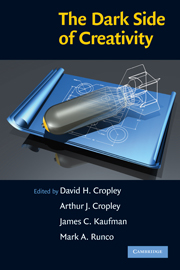Book contents
- Frontmatter
- Contents
- List of Contributors
- 1 The Dark Side of Creativity: What Is It?
- 2 Creativity Has No Dark Side
- 3 Positive Creativity and Negative Creativity (and Unintended Consequences)
- 4 Subjugating the Creative Mind: The Soviet Biological Weapons Program and the Role of the State
- 5 Imagining the Bomb: Robert Oppenheimer, Nuclear Weapons, and the Assimilation of Technological Innovation
- 6 The Innovation Dilemma: Some Risks of Creativity in Strategic Agency
- 7 Early Creativity as a Constraint on Future Achievement
- 8 Boundless Creativity
- 9 Reviewing the Art of Crime: What, If Anything, Do Criminals and Artists/Designers Have in Common?
- 10 Creativity in Confinement
- 11 Creativity and Crime: How Criminals Use Creativity to Succeed
- 12 So You Want to Become a Creative Genius? You Must Be Crazy!
- 13 Both Sides of the Coin? Personality, Deviance, and Creative Behavior
- 14 Neurosis: The Dark Side of Emotional Creativity
- 15 Dangling from a Tassel on the Fabric of Socially Constructed Reality: Reflections on the Creative Writing Process
- 16 Creativity in the Classroom: The Dark Side
- 17 The Dark Side of Creativity and How to Combat It
- 18 A Systems Engineering Approach to Counterterrorism
- 19 Malevolent Innovation: Opposing the Dark Side of Creativity
- 20 Summary – The Dark Side of Creativity: A Differentiated Model
- Index
- References
17 - The Dark Side of Creativity and How to Combat It
Published online by Cambridge University Press: 05 June 2012
- Frontmatter
- Contents
- List of Contributors
- 1 The Dark Side of Creativity: What Is It?
- 2 Creativity Has No Dark Side
- 3 Positive Creativity and Negative Creativity (and Unintended Consequences)
- 4 Subjugating the Creative Mind: The Soviet Biological Weapons Program and the Role of the State
- 5 Imagining the Bomb: Robert Oppenheimer, Nuclear Weapons, and the Assimilation of Technological Innovation
- 6 The Innovation Dilemma: Some Risks of Creativity in Strategic Agency
- 7 Early Creativity as a Constraint on Future Achievement
- 8 Boundless Creativity
- 9 Reviewing the Art of Crime: What, If Anything, Do Criminals and Artists/Designers Have in Common?
- 10 Creativity in Confinement
- 11 Creativity and Crime: How Criminals Use Creativity to Succeed
- 12 So You Want to Become a Creative Genius? You Must Be Crazy!
- 13 Both Sides of the Coin? Personality, Deviance, and Creative Behavior
- 14 Neurosis: The Dark Side of Emotional Creativity
- 15 Dangling from a Tassel on the Fabric of Socially Constructed Reality: Reflections on the Creative Writing Process
- 16 Creativity in the Classroom: The Dark Side
- 17 The Dark Side of Creativity and How to Combat It
- 18 A Systems Engineering Approach to Counterterrorism
- 19 Malevolent Innovation: Opposing the Dark Side of Creativity
- 20 Summary – The Dark Side of Creativity: A Differentiated Model
- Index
- References
Summary
CREATIVITY AND EVIL
Creativity involves producing ideas or products that are novel and high in quality or impact (Sternberg & Lubart, 1995; see also essays in Sternberg, 1999). On the face of it, many of the vexing problems that exist in the literature on creativity, such as how to recognize it or how to measure it, can be and have been addressed, if not totally resolved. There are other problems, however, that are even more vexing and that defy easy resolution. Was Joseph Mengele creative in devising novel medical procedures for torturing patients? What about Adolph Hitler and his cronies in devising novel means of mass extermination or Joseph Stalin in devising an elaborate series of prison camps into which were placed real and imagined political enemies? If the novelty criterion were the only one for deciding on levels of creativity, all these madmen would be called creative. But we distinguish between originality, which involves only novelty, and creativity, which involves quality or impact as well as novelty. Much of the time, quality and impact go hand in hand, but in the cases just cited, it is not obvious that they do. Mengele, Hitler, and Stalin all had great impact with their ideas, but the ideas were not good ones.
Or were they? Revisionist history in Russia is glorifying the contribution of Stalin to the history of the country, stating that however harsh his measures, they were necessary given the times.
- Type
- Chapter
- Information
- The Dark Side of Creativity , pp. 316 - 328Publisher: Cambridge University PressPrint publication year: 2010
References
- 30
- Cited by



